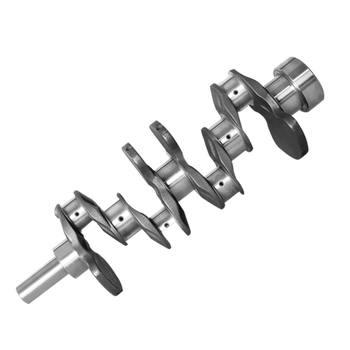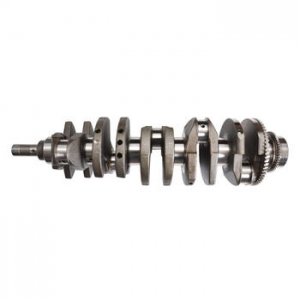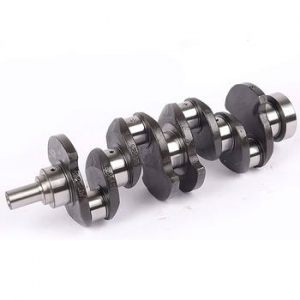
A crankshaft is a crucial component of your engine, converting the reciprocating motion of the pistons into rotational motion to power your vehicle. A failing crankshaft can lead to significant engine damage and costly repairs. Therefore, recognizing the symptoms of a bad crankshaft early is essential. This guide will delve into the various signs, helping you understand the underlying issues and take appropriate action.
Common Signs of Crankshaft Problems
One of the most noticeable symptoms of a bad crankshaft is a loud knocking sound coming from the engine. This knocking is often rhythmic and increases with engine speed. This "rod knock" originates from damaged connecting rod bearings, which are directly linked to the crankshaft. Imagine the crankshaft as the backbone of your engine; if the backbone is damaged, the whole system suffers.
Another common symptom is low oil pressure. The crankshaft relies on a constant flow of oil for lubrication and cooling. A damaged crankshaft can disrupt this flow, leading to low oil pressure readings. Ignoring this warning sign can exacerbate the problem and cause further damage to the engine. Regularly checking your oil level and pressure is a good preventative measure.
Excessive engine vibrations can also indicate a failing crankshaft. A bent or damaged crankshaft can create imbalances in the engine's rotation, leading to noticeable vibrations. These vibrations can be felt throughout the vehicle, especially at higher speeds. Would you feel comfortable driving a car that shakes uncontrollably? Probably not!
Understanding the Causes of Crankshaft Damage
Several factors can contribute to crankshaft problems. One primary culprit is lack of lubrication. Insufficient oil can cause excessive friction and heat, leading to wear and tear on the crankshaft bearings. Another common cause is engine overheating. Extreme temperatures can warp the crankshaft, causing it to bend or crack. Finally, physical damage from debris or a failed connecting rod can also compromise the integrity of the crankshaft.
Crankshaft Position Sensor Problems: A Related Issue
Sometimes, the symptoms might point towards a bad crankshaft when the actual problem lies with the crankshaft position sensor. This sensor relays crucial information about the crankshaft's position to the engine control unit (ECU). A faulty sensor can disrupt engine timing, leading to symptoms similar to a bad crankshaft, such as rough idling, misfiring, and difficulty starting. Therefore, it’s important to consider this possibility when diagnosing engine problems.
Diagnosing Crankshaft Issues
Identifying the exact cause of crankshaft problems requires a thorough inspection by a qualified mechanic. They may use specialized tools like a borescope to visually inspect the crankshaft or perform an oil pressure test to assess the lubrication system. They might also check for diagnostic trouble codes related to the crankshaft position sensor. Accurate diagnosis is crucial for determining the appropriate course of action.
Repairing or Replacing a Bad Crankshaft
Repairing a damaged crankshaft can be a complex and expensive undertaking. In many cases, complete crankshaft replacement is the most viable option. This involves removing the engine and disassembling it, making it a labor-intensive process. The cost can vary significantly depending on the vehicle’s make and model.
Preventing Crankshaft Problems
While not all crankshaft issues are preventable, regular maintenance can significantly reduce the risk. Regular oil changes, using the correct oil viscosity, and ensuring the cooling system is functioning optimally can help prevent premature wear and tear on the crankshaft. Addressing engine overheating promptly is also crucial.
What Should You Do if You Suspect a Bad Crankshaft?
If you notice any of the symptoms mentioned above, it’s crucial to take your vehicle to a qualified mechanic immediately. Continuing to drive with a suspected bad crankshaft can lead to catastrophic engine failure. Early diagnosis and intervention can save you time, money, and the hassle of dealing with a completely ruined engine. Don’t delay; get it checked out!
Next Steps
Don't let a bad crankshaft ruin your engine. If you’re experiencing any of these symptoms, schedule an appointment with a trusted mechanic today. Early detection is key to preventing extensive damage and costly repairs. Remember, a well-maintained engine is a happy engine! So, what are you waiting for? Get your engine checked now!




